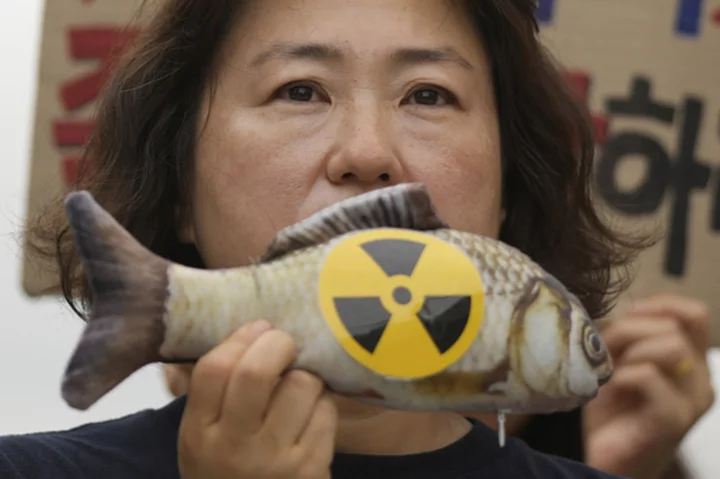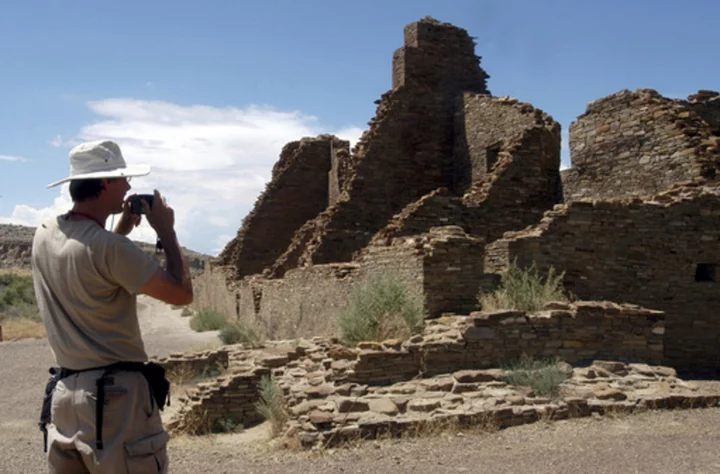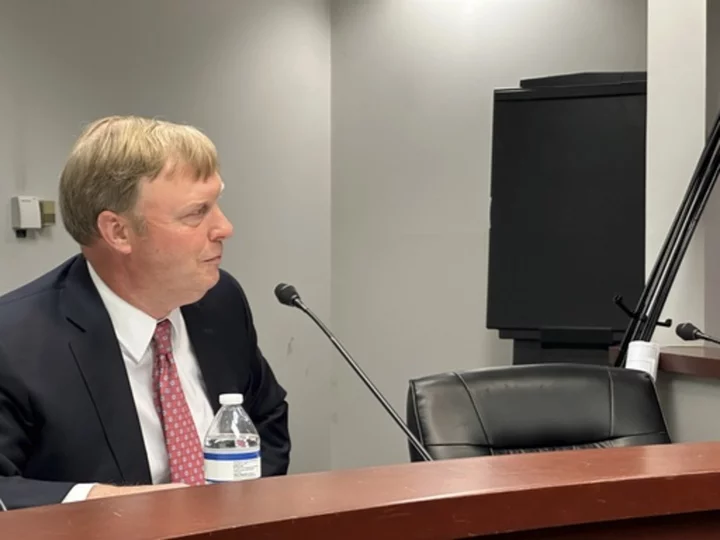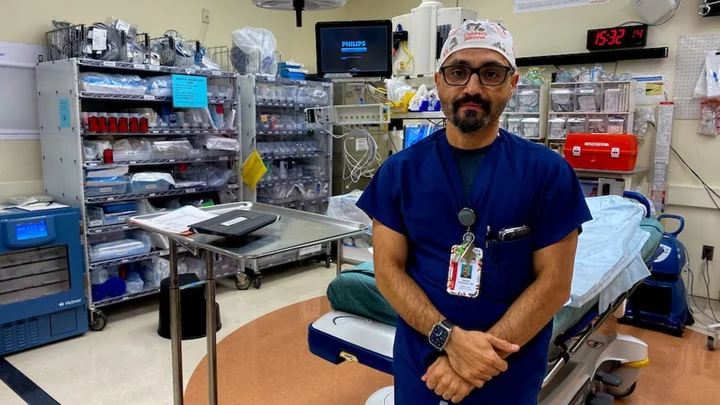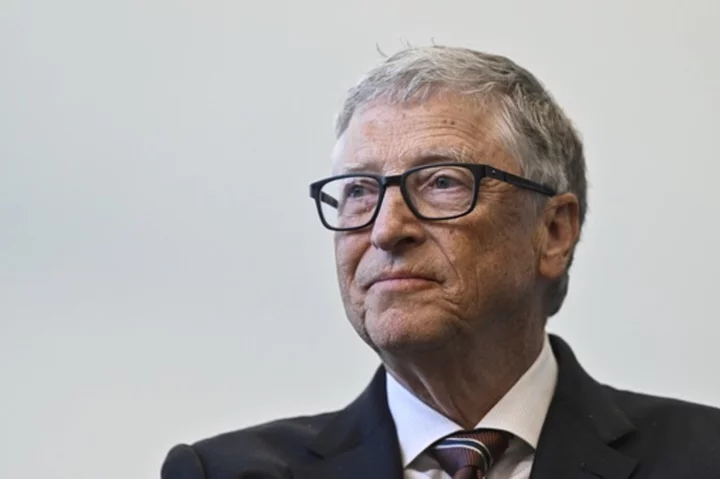SEOUL, South Korea (AP) — Seoul office worker Kim Mijeong says she intends to stop eating seafood because she deeply mistrusts the safety of Japan’s release of treated radioactive wastewater into the sea from its crippled nuclear power plant.
“We should absolutely cut back on our consumption of seafood. Actually, we can't eat it,” Kim said. “I can’t accept the Japanese plan because it’s too unilateral and is proceeding without countermeasures.”
The International Atomic Energy Agency and many foreign experts already assessed the water discharge will cause negligible impact on the environment and human health. But ahead of the discharge of the wastewater starting Thursday, public fears and frustrations were being shared in its Asian neighbors, where many still bear strong resentment against Japan’s wartime aggression.
China summoned Japan’s ambassador in Beijing earlier this week to register its complaints, and a government spokesperson called the discharge plan “extremely selfish and irresponsible.” Hong Kong and Macau said they were banning seafood from Fukushima and nine other Japanese prefectures.
In South Korea, fierce domestic political wrangling has erupted over its own government’s endorsement of the safety of the Japanese plan. Liberal critics accused the conservative government led by President Yoon Suk Yeol of pushing to improve ties with Japan at the sacrifice of public health.
“The Yoon Suk Yeol government and the ruling People Power Party are accomplices in the dumping of the wastewater,” Kwon Chil-seung, a spokesperson for the main opposition Democratic Party, said.
The ruling party accused the opposition of inciting anti-Japan sentiments and public fears for political gains, undermining South Korea's national interests and driving those in the domestic fisheries and seafood industries to the edge.
Yoon’s government and the Democratic Party have already fought bitterly over another Japan issue — Yoon’s contentious decision to take a major step toward easing bilateral historical grievances over former forced Korean laborers during the Japanese colonial period. The Democratic Party slammed Yoon for allegedly making concessions preemptively to Japan without receiving corresponding steps in return. Yoon maintains that improved ties with Japan are necessary because of shared challenges like North Korea’s advancing nuclear arsenal and the intensifying U.S.-China rivalry.
Yoon administration officials said the treated and diluted wastewater would have insignificant effect in South Korea's waters. They’ve been trying to ease public concerns by holding daily briefings and expanding radiation tests on seafood at major fish markets in South Korea. Last month, some ruling party lawmakers even drank seawater taken from fish tanks at a seafood market in Seoul in a bid to emphasize food safety.
But surveys of South Koreans showed that more than 80% of respondents opposed the Japanese discharge plan while more than 60% said they won’t eat seafood after the water release begins.
“I totally oppose the Japanese plan. The radioactive wastewater is truly bad thing,” said Lee Jae-kyung, 51, a Seoul resident. “My feelings toward Japan have worsened because of the wastewater release."
Fears about the wastewater are taking a heavy toll on some businesses in South Korea’s seafood industry.
In a seafood market in the southeastern port city of Busan, fishmonger Kim Hae-cheol said his revenues have halved since a few months ago and worried that his business would suffer more after the wastewater discharge begins.
“I haven’t had any customers today. In past years, I sold fish worth 400,000-500,000 won ($300-380) by this time around on a normal day,” Kim said in a midday phone interview Wednesday. “Others in this market have had few customers today as well.”
Kim said seafood will be safe to eat, saying he trusts the safety reviews by IAEA, Japanese and South Korean officials. He said his business has been battered mainly because some opposition politicians and media outlets “make much ado.”
“If the wastewater is really bad, Japanese people would be the first ones to be affected? Right?” Kim, 75, said. “I think the Japanese government has been handling things scientifically.”
Japan also faced strong protests from local fishing organizations, which worry their catches will be shunned. Japanese Prime Minister Fumio Kishida has promised his government’s full support for fishing communities during the decades the wastewater will be released. The National Federation of Fisheries Cooperatives opposes the release, but its leaders say some members have gained confidence in the plan's safety.
Hong Seong-been, a Seoul resident, said political strife over the release has left many with a lack of genuine information about whether the water is truly safe or not.
It’s unclear if the wastewater discharge would lead to a major outburst of anti-Japan sentiments in South Korea. Several Seoul travel agents reached by phone said the number of South Korean tourists going to Japan has been generally on the rise or has largely remained the same in the past months.
In Taiwan, reactions to the wastewater release plan were muted. On a governmental level, Taipei is aligned with Tokyo on a score of issues and hasn’t been vocal about opposing the discharge plan, which has been portrayed by Taiwanese media as conforming to international norms.
Taiwan’s Atomic Energy Council, a government agency, has in the past expressed concern over the discharge. On Tuesday, the council said it would closely monitor radiation levels in waters around Taiwan.
The Philippines, which gets coast guard vessels and other aid from Japan, also stressed it was looking at the issue from a scientific perspective and recognized the IAEA's expertise.
“As a coastal and archipelagic State, the Philippines attaches utmost priority to the protection and preservation of the marine environment," the Department of Foreign Affairs in Manila said in a statement.
__
Associated Press writers Simina Mistreanu in Taipei, Taiwan, and Jim Gomez in Manila, Philippines, contributed to this report.

